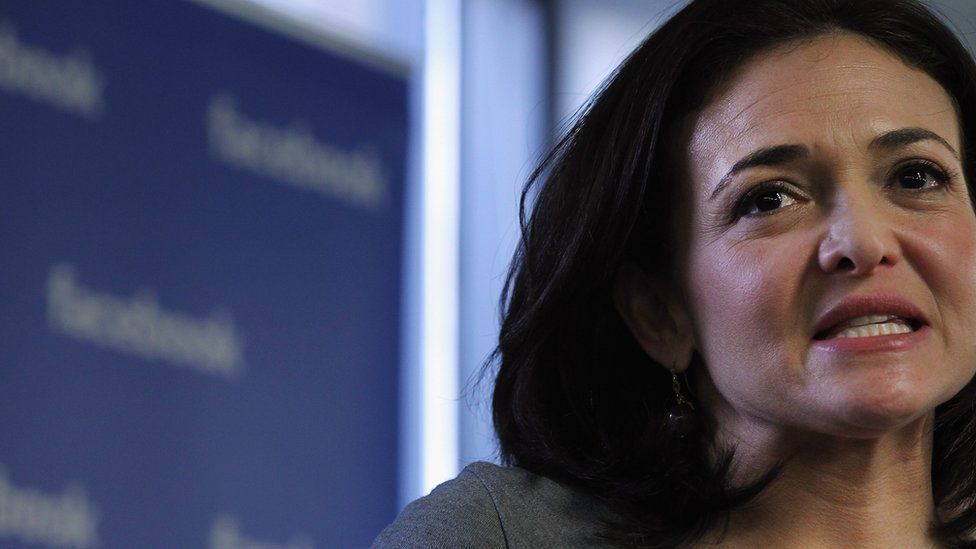Facebook bereavement leave: How long is long enough?
- Published

Facebook last week doubled its bereavement leave allowance for its staff. Employees can now take up to 20 days off with pay to mourn the death of an immediate family member.
The new policy was announced by Facebook's chief operating officer, Sheryl Sandberg, who has spoken publicly about mourning her husband, Dave Goldberg, who died in 2015.
"We need public policies that make it easier for people to care for their children and aging parents and for families to mourn and heal after loss," Ms Sandberg posted on Facebook.
She added that companies that stand by the people who work for them do the right thing and "improve their bottom line by increasing the loyalty and performance of their workforce".
The move has sparked huge debate on social media and has been lauded as extremely generous. Is it enough? We asked the views of four people dealing with grief in the workplace.
A bereaved father
Chad Andrews and his family returned home from an Alaskan cruise three years ago when his eight-year-old son, Connor, was rushed to hospital a few days later.
Connor had mild flu symptoms that suddenly worsened. He was placed in intensive care but deteriorated rapidly.
In June 2014, he died of myocarditis - an inflammation of the heart stemming from a virus.
Mr Andrews told the BBC that his life became a blur. He had lost an "exceptional, brilliant and beautiful" son and was left in shock.
But he forced himself to return to work a fortnight later even though he admits he wasn't very productive.
"When you're paralysed by grief and it's all your mind can absorb, the last thing you care about is work," he says. "I had no capacity to be in control or function in the everyday world."
Mr Andrews works at IBM where he builds technology platforms for video content. Officially, the company gives staff three days of bereavement leave but he says there was never any pressure for him to return.
After many stops and starts, it took him seven weeks to resume work full-time.
While he believes there is no magic formula, he says Facebook's 20 days bereavement leave "seems like a good best effort to set an effective benchmark".
But he adds that it depends on when the individual can function again.
A grief counsellor
Chan Lay Lin has been a social worker and family therapist for more than 20 years.
She is a principal medical social worker at Singapore's Institute of Mental Health and says most organisations in Singapore will allow about three days of compassionate leave when a staff member suffers a bereavement.
In her experience, this is adequate when the circumstances are not overly traumatic. But she says in exceptional cases experienced by around one in seven people, a longer grieving period may be needed, with the approval of a doctor or therapist.
The factors considered, she says, include the relationship with the deceased, the level of attachment and dependency and the nature of the death. Sudden and unexpected deaths are all the more traumatic.
Ms Chan says in severe cases some people may never feel like they get back to normal and can fall into depression, making them unable to go back to work for a long time.
For those people the grief may never end, even if it gets easier to bear. But she stresses these are very rare and extreme cases.
A boss
Peter Wilson has been a boss working in human resources for 33 years, and is the chairman of the Australian Human Resources Institute.
According to him, the standard for bereavement leave in democratic, Western cultures is between two and five days.
When his own parents died he used compassionate leave to take one day off for the funeral and another to grieve with his family. He took an extra week of annual leave in each instance, which he describes as a "fair balance".
Mr Wilson believes Facebook's bereavement leave policy is unusual and doubts it will be adopted widely. Twenty days amounts to nearly 10% of the working year, which he says would be "excessive" if it became law.
His concern is that it would put pressure on employers to increase other categories of leave too. "This could have a knock-on effect which could make companies uncompetitive," he says.
He favours a "sensible, minimum standard which the government prescribes and the discretion to give more leave on a case-by-case basis".
Ten years ago, he granted three months' paid leave to an indigenous employee on cultural grounds.
Mr Wilson says most employers will extend leave provisions where there's a good case for it.
A headhunter
Dan Clements is the managing director of the technology executive recruitment firm, Identify, and says most people probably do not factor in bereavement leave when they are deciding whether to join a company.
However, he believes a firm's compassionate leave policy could give potential employees insight into its culture and ethics. Firms that take a mature and humane approach stand to attract great talent because employees want to be treated fairly and with kindness, he says.
Mr Clements surveyed the compassionate leave policies of 10 multinational companies. They all offered between three and 10 days, with five days being the most common.
One firm went further, giving its managers discretion to grant staff more days off for a bereavement.
But he says companies can do more by offering flexible working arrangements such as remote or part-time working, as well as job sharing to help staff in need of more time to grieve.
- Published16 February 2017
- Published16 February 2017
- Published7 May 2016